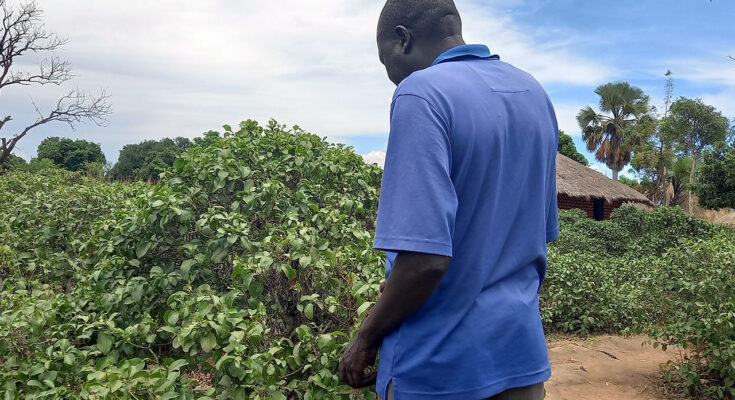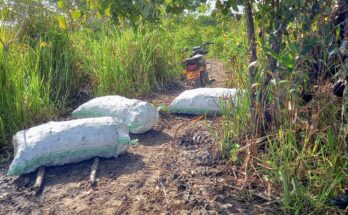PHOTO: A man tends to his mairungi/miraa garden -Photo by Simon Wokorach
Yumbe:
In the Western part of the District Headquarters, Mohammed Yada would sit as he adores his sprouting mairungi plants in about two hectares of land at Aunga village in the post-conflict Northern region.
The plantation is dotted in the neighbourhood too but March 15, 2023, was engulfed with relatively high temperatures as the youths gathered to chew fresh khat leaves from the garden.
At the different routes within the District, the youths are seen gathering along the road, some selling fresh leaves of khat tree or mairungi as it is commonly known here while others would lie on the wooden benches as they stare at the travellers.
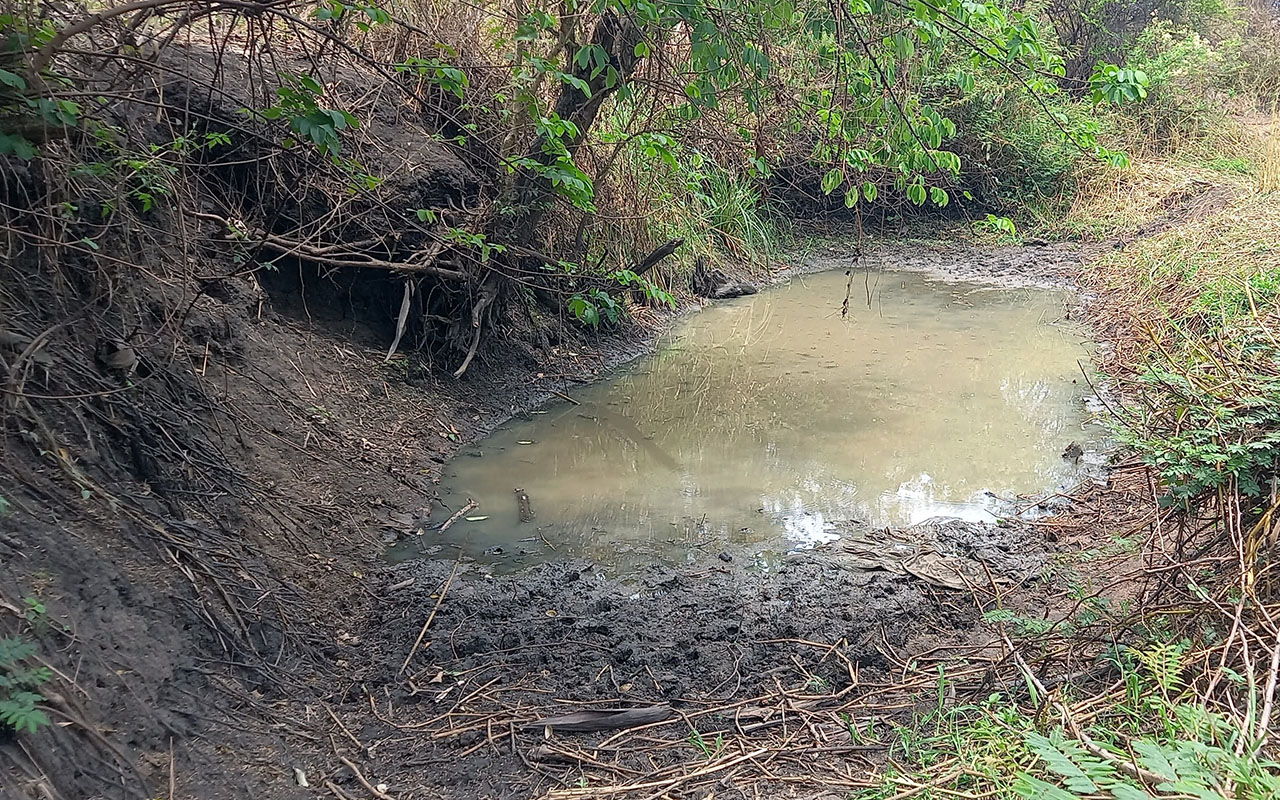
The West Nile District of Yumbe has seen unprecedented growth of narcotic plantations as farmers abandoned traditional crops over unpredictable weather patterns in the region. The local farmers claimed that traditional crops such as maize, beans and sorghum hardly survive as the area has continued to receive unreliable rainfall in the past decades.
Mohammed had just returned and resettled home from the Democratic Republic of Congo where he spent years on treatment at the government health facility in Bunga.
1996 was a year of distress as the region was infested with hostility from different rebel activities who terrorized the land for decades soon after the National Residence Army seized power.
Mohammed was in his late 20s when he was attacked by bandits from the West Nile Bank Front, formerly led by the current Third Deputy Prime Minister, Retired General Moses Alii.
“They shot 7 of us dead because we couldn’t join them in the bush. They shot me in the chest, leg and back and left thinking I was dead. I was taken for treatment in the Democratic Republic of Congo but I returned home later with physical disability and the bullets have remained inside me until now,” Mohammed went wild in memory.
While he battles to rehabilitate his family, to Mohammed, the changing weather pattern has caused misfortune to his recovery where traditional crops had found it difficult to survive in the region.
In his mid-50s, Mohammad said he was forced to abandon growing food crops after several unsuccessful attempts yet he could not have enough food in the house to feed his family.
The area which would receive two rain seasons has continued to experience drastic weather conditions as several farmers shift from growing traditional crops to narcotic production amidst worrying mental health conditions in the North.
Mairungi, the spread in Africa and the consequences on health
Mairungi or Khat leave use is a drug problem characteristic of the Eastern Mediterranean Region, which is a widespread culturally accepted practice in some Countries in the Middle East and is becoming more prevalent in other African Countries, including Uganda.
The World Health Organization observed that, although limited use may not be accompanied by serious consequences, prolonged exposure could lead to dependence, psychosis and other psychiatric disorders and physical conditions such as hypertension, cardiovascular complications, sexual dysfunction, and reduced birth weight of infants born to khat-chewing mothers while its widespread use is considered a burden on health and economy of the nation.
Khat tree has its unique characteristic of use and is widely prevalent in Countries like Yemen, Kenya, Somalia, Ethiopia and Djibouti and an increasing pattern is reported from Countries such as Oman and Saudi Arabia.
There’s also a growing problem of khat use in the United Kingdom and European Countries, specifically among the migrant communities with the estimation that more than 10 million people reportedly use khat on a daily basis.
Khat comes from the young and tender leaves and shoots of the khat tree, the leaves have been consumed for centuries for their mildly stimulating properties caused by several alkaloids and other chemical compounds which have far-reaching negative impacts on humans and animals.
Today, soon after harvesting, the twigs and shoots are rolled into bundles and wrapped in banana leaves in order to retain moisture but in most instances, bundles are the traded units which are openly sold along the highways and streets in the Cities of Gulu, Arua and Lira.
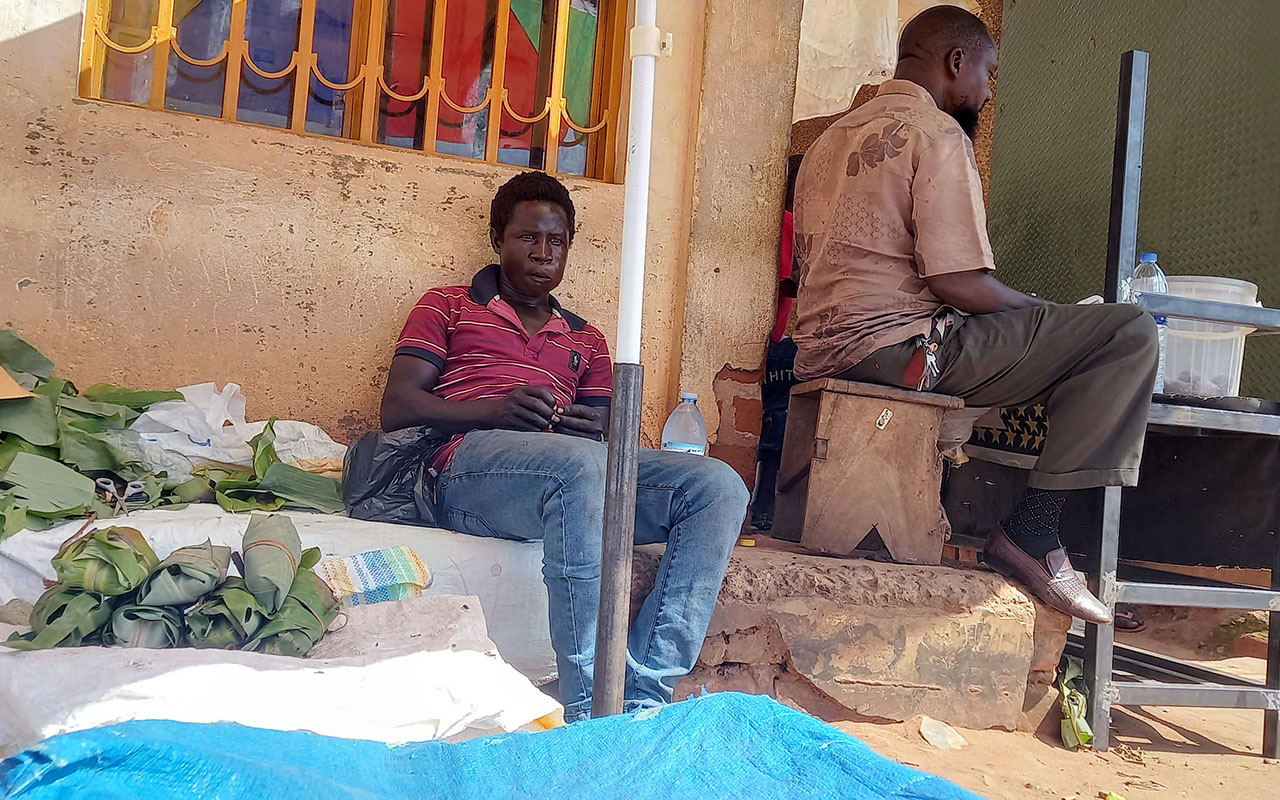
The ones who chew the leaves and tender stems usually keep them in a tightwad in the cheek and shortly after about 30- 60 minutes, the user experiences nervousness and illusion. This is followed by a quieter, more introverted phase, giving way to a gradual comedown, and often restlessness, irritability and a depressive reaction.
These unpleasant after-effects according to World Health Organization, motivate khat chewers to carry on chewing without stopping where they often experience sleep problems during the night and a hangover the next morning resulting in psychological withdrawal symptoms at the time of the day of their usual khat intake which involves restlessness, concentration difficulties, irritability and impaired impulse control.
Is Climate Change driving farmers to narcotic cultivation in the North?
To farmers like Mohammad, turning to mairungi plantation was an option for survival since crops like beans, maize and sorghum which were grown on a large scale in the region are adversely affected by climate change.
With the changing weather, the major swamps in the area too have dried which has far-reaching effects on both farming and safe water in the area. “I saw many of the youths in the region chewing this plant and I knew there was already a market,” Mohammad disclosed in a recent interview.
Though he operates in the illicit market, from a monthly sale, Mohammad realizes on average 800,000 shillings. This has attracted most of the local farmers to the new plantation.
In the same neighbourhood, one Anuna Owoko, a 33-year-old mother from Kuru Sub County, had gone to fetch water a distance away from home. Three men who had just chewed the leaves were laying restlessness on the mat while some were still in the garden in the backyard chewing fresh leaves.
“I used to grow sunflowers, groundnuts and maize but all can’t now survive in this land. We realized that mairungi doesn’t need much rain and can still survive here,” Anuna noted as she proceeded and joined the youths who were in her hectare of mairungi plantation.
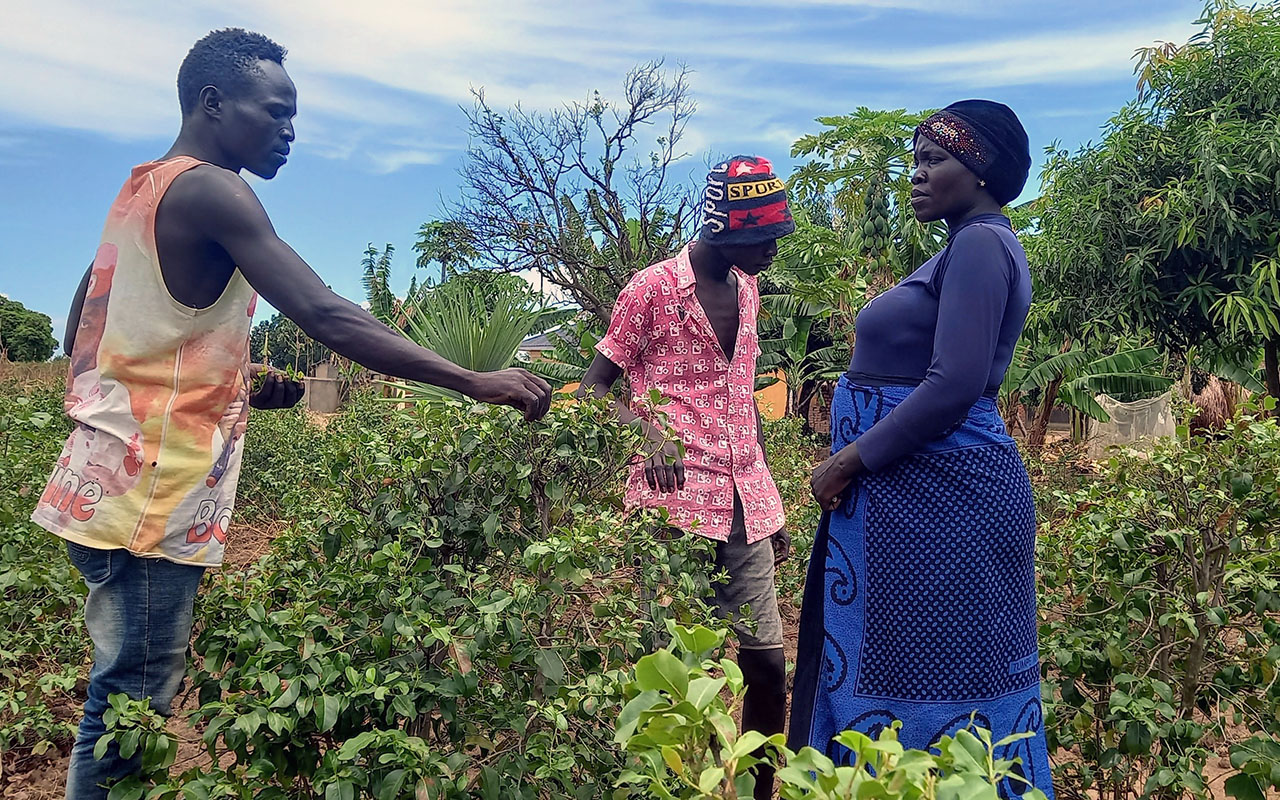
It was lunchtime when Tairi Aniku aged 26 was in the company of others in the garden where fresh leaves of mairungi turned out to be their daily food. “I always lose appetite for food once I chew these plants and I can stay for three days without eating food. As you can see, this area doesn’t have enough food,” Aniku told this reporter.
Once he needs food, Aniku said, at times there would be nothing at home to eat but to avoid quarrelling with his wife, he would only look for leaves in the neighbourhood to chew and forget about food.
A primary school teacher-turned-farmer, Tabuga Rehuman who supplements his meagre pay from a privately owned school with farming, raised similar concerns about unreliable rainfall which left many farmers hopeless in growing traditional crops and are now suffering severely from weather changes.
“We noticed that this plant is resistant to this harsh weather and because we must survive, every household here can’t avoid it even when we know it’s illegal to produce,” Tabuga disclosed.
The farmers in the area have however established strong market linkages and networks with the neighbouring States of South Sudan and the Democratic Republic of Congo where such products are smuggled through their porous borders to evade taxation from the District Revenue enforcement team.
Ugandan weak laws on narcotic cultivation, export and consumption
Ugandan laws criminalise the use of mairungi among other narcotic drugs and substances and their production, sale and consumption but the implementation of the law has not been effective since its enactment.
Under the 2015 Narcotic Drugs and Psychotropic Substance Control Act, one can be convicted for possession of the substance to a jail term of not less than two years but not exceeding ten years. The law further provides for liability of fine for a person found in possession of the Narcotic Substance to a payment of five hundred currency points or three times the market value of that drug.
Despite the ban on Mairungi products in Uganda, the Yumbe District Local Government has continued to generate local revenue from the illegal production, sale and consumption.
The District Council has levied a fee of 2000 shillings on each mairungi plant which is to be paid twice a year but the plantation has an average of 450 trees, meaning, billions of shillings to come from such cultivation as local revenue to finance their activities.
The District with 19 Sub Counties and 6 Town Councils has at least 200 plantations in each of those administrative units with over 13,000 households and a total population of 997,370 people.
The District has projected to raise 1.8 billion shillings from the illegal trade but the projection, according to the District Planning Department, is an estimate which may not represent the current production.

The District Chief Administrative Officer, Stephen Gunya disclosed that the high tariff levied on mairungi plantation is to discourage its production and to redirect farmers to other climate-resilient crops.
He revealed that the District has partnered with the World Bank to introduce fast-growing crop varieties which are resistant to climate change to turn farmers back to the production of food crops and enhance food security.
The Yumbe District Vice Chairperson Linus Kayiah however noted that mairungi production is taken up by most of the traditional tobacco farmers after tobacco production phased off from the region. He also noted that mairungi or khat is not clear whether it is a drug or a crop that is worth promoting, adding that the plant is not clearly classified in the law which makes it difficult to stop.
The Council resolution has however been outrageously objected by the Youth Council that most of the youths in the region have become addicted, redundant and mentally disturbed.
The District Youth Chairperson Mahad Azabo noted that, while the District moved to tax the mairungi farmers, most of the youths are battling with mental illness due to drug and substance abuse disorders.
He, however, disclosed that the Youth Council has resolved to revoke the production, sale and consumption of mairungi and has petitioned the District to withdraw from taxing the farmers but to enact an ordinance instead to curtail its production.
What experts say
To Climate Change Scientists, the current weather changes can still support the traditional crops which the farmers have started abandoning from the region due to their low survival rate and harvests.
According to a Climate Change Consultant, Desimond Anywar, the changing weather now requires farmers to adapt to new farming which is supported by timely information sharing on the weather forecast.
Once farmers are able to know the weather changes, they can make good choices on the best crops to grow which have fast maturity growth. This will create scenarios where farmers have to shift away from the old tradition of relying on planting seasons where rainfalls were experienced throughout the year.
“We can’t say the farmers should now turn to cultivation of narcotic plants as their coping mechanism. Here I see two problems, one, it will create food shortage and the second is the impact of those plants on the mental well-being of the people who are just coming out of the war,” Anywar observed.
Meanwhile, Psychiatrists have described mairungi or khat as a stimulant plant which changes the actions and moods of the consumers leading to problem conduct.
Freddie Odong, a Psychiatrist with Sheffield Mental Organization attached to Gulu Regional Referral Hospital Mental Health Unit discloses that mairungi substances reduce one’s mental ability. The drug, according to him, makes the brain very active but reduces its ability to act carefully to solve problems which leads to depression, and anxiety, the most common mental illnesses in the region.
He revealed that about 65 per cent of the men in Northern Uganda battling with mental illnesses are due to drugs and substance abuse while their female counterparts account for 35. The management of such patients is extremely difficult and the facilities for supporting the care are lacking.
Gulu Regional Referral Hospital receives on average 10 new patients with mental illnesses while between 400 to 500 patients seek weekly medical attention at the facility, most of whom return for care and treatment on appointments with the Psychiatrists.
“Drug addiction is very difficult to manage and it affects brain development. Unfortunately, we don’t have machines to diagnose these patients and there aren’t treatment drugs for them,” Odong explained.
Besides its expensive management and treatments, Odong noted that the facilities for mental health care and support are limited and inadequate.

Whereas the North is battling for its economic recovery after the devastating war waged by the Lord’s Resistance Army, mental illnesses are yet another emotional and psychological war wreaking havoc in the region. Mental health activists say urgent attention is needed for holistic interventions.
Gulu Regional Referral Hospital received 9,061 patients with different mental health conditions in 2020 but the current weekly attendance of patients returning for treatment is between 400 to 500 with at least 10 new cases reported to the facility on a weekly basis currently.
The Psychiatric report at Gulu Regional Referral Hospital revealed that the treatment of a single patient costs more than a million Shillings, which the government is not providing as patients are required to foot their own bills from the Pharmacies, the majority of whom cannot afford, a factor that accounts for more patients on the streets as they lose contact with the reality.
Naltrexone, one of the most expensive drugs used for the treatment of mental health patients, tentatively costs the government Shillings 650,000 for a single dose to administer a patient.
The drug has not been delivered to the hospital for decades and is used for treating patients with substance abuse disorders since it helps to reduce the rewarding effects and craving for alcohol and other drugs which decreases the relapse rate in patients.
The hospital report further revealed that each patient with the above conditions is required to undergo treatment for three months but the region does not have a rehabilitation centre for mental health care. At Gulu Regional Referral Hospital, only 40 patients can be accommodated in the Psychiatric Ward.
Constitutional Court leaves scars on mental health safety
Meanwhile, the war against curtailing the consumption of toxic substances arising from narcotic plants in the Country still hangs in balance as the Court quashed its law.
The Constitutional Court has nullified the Narcotic Drugs and Psychotropic Substances Control Act, of 2015, which criminalized the cultivation, distribution and exportation of khat or mairungi.
The Court ruling follows a 2017 petition by the farmers growing mairungi or khat under their umbrella body, Wakiso Miraa Growers and Dealers Association Limited who sought to overturn a parliamentary decision to ban the sale and use of mairungi.
The petitioners contended that parliament was inconsistent with principles of legality, equality, rationality and proportionality guaranteed under the constitution since they were never consulted.
Recently, a panel of five judges threw out the entire Law on technical grounds, ruling that the manner in which it was enacted was illegal and repealing it was the only remedy because of a requirement by the parliamentary rules of procedure of having a quorum before any Bill is passed.
“In the premises, I would declare the Narcotic Drugs and Psychotropic Substances (Control) Act, 2015 null and void for lack of quorum on the part of parliament, contrary to articles 88 and 89 of the constitution and rule 23 of the rules of procedure of the 9th parliament, 2012 made, pursuant to articles 88 and 94 of the constitution,” said Muzamiru Mutangula Kibeedi, justice of the Constitutional Court, in his lead judgement.
Responding to the ruling, the former leader of the opposition in parliament, Betty Aol Ocan who is the Women Member of Parliament for Gulu City called the ruling by the Constitutional Court a war against the struggle to protect Ugandans from consumption of illicit drugs whose negative impacts are immense on the national economy.
“The cost of treating mental illnesses is huge, especially in the Northern Part of the Country which is still limping with recovery and development but I don’t know why the Judges in their wisdom could allow such a thing to happen to this Country if we must protect the youths,” Aol observed.
Aol revealed that Parliament will seek guidance from the Parliamentary Legal Committee on returning the Bill to the house for debate and passing it again to safeguard the Country, especially the youths from high drug consumption that affects their mental wellness.
“We still don’t know whether the Bill will come back to Parliament from the Government but if it will have to come through a Private Member’s Bill then the process will take so long that the 11 Parliament may not handle it. This is the far this country can take where the government has no interest,” Aol further added.
As the ruling sparks off debates and attracts concerns, the Judiciary in its press statement issued on May 9, 2023 noted that the ruling by the Constitutional Court does not legalize the use of marijuana in the Country and does not invalidate sections of the Law which still remains restricted under the National Drugs Policy and Authority Act.
“It’s indeed true that in 2015, the Parliament of Uganda passed the Narcotic Drugs and Psychotropic Substances (Control) Act (herein referred to as the Act) which set the control of various drugs including marijuana and khat locally known as miraa or mairungi,” the statement reads in part.
The Uganda police have however warned that they will continue using the old Law (National Drugs Policy and Authority Act) to fight against illegal consumption of drugs in the Country.
“We still maintain a zero-tolerance approach to the consumption of substances prohibited under the National Drugs Policy and Authority Act. All our territorial commanders have been instructed to maintain or step-up enforcement action against offenders and enhance deterrence efforts to help stop narcotic drug consumption in the country and crimes driven by it” Uganda Police Spokesperson Fred Enanga warned after the Constitutional Court ruling.
This story was produced with support from Aga Khan University Graduate School of Media and Communications on its program of Excellence in Health Journalism Cohort III.

